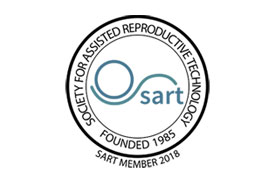Women are born with a lifetime supply of eggs, called ovarian reserve.
Your fertility depends on the quantity and quality of your eggs.
As women age and approach menopause, the quantity and quality of the eggs decreases, and so do the ovarian reserve and the chances of pregnancy. It is normal for most women to have reduced ovarian reserve and fertility by their mid-40s, but for some women, the ovarian reserve and fertility can diminish much earlier, as early as in their 30s.
In these cases, the condition is called Premature Ovarian Insufficiency (POI).
Diminished ovarian reserve is the result of normal aging and means that your ovaries have fewer eggs. When eggs are lower in number, their quality can also be affected – with more chromosome abnormalities – which causes lower pregnancy rates and higher miscarriage rates.
Between 10 and 20% of women who see their infertility doctor are diagnosed with diminished ovarian reserve.
For women younger than 40 years old, the condition of diminished ovarian reserve or POI is not part of normal aging and can be caused by diseases, such as genetic or chromosomal disorders, endometriosis, ovarian surgeries, immunological disorders, or lifestyle factors like smoking.
Our fertility experts use various tests to discover a woman’s fertility potential and to assess ovarian reserve. Although there’s no single test that can predict your ability to get pregnant, the testing allows us to personalize your fertility treatment plan.
It lets us to discuss with you what methods we should offer you for the best possible chance of becoming pregnant.
Testing for Diminished Ovarian Reserve
Initially, there are no symptoms of diminished ovarian reserve. Over time, the menstrual cycle may shorten a few days from a regular 28-day cycle. Closer to menopause, women may notice missed periods, hot flashes, difficulty sleeping, vaginal dryness, and other signs of lower estrogen levels.
We use a variety of tests to assess your ovarian reserve and predict your fertility potential, including:
Antral Follicle Count (AFC)
We use a transvaginal ultrasound probe (inserted into your vagina) to count the small ovarian follicles (also called antral follicles) where eggs develop, and that can be seen in the first five days of your menstrual cycle.
The AFC tells us how many eggs you have at the beginning of a cycle and help us to decide a proper treatment protocol for you and to predict how you will respond to the fertility medicines (gonadotropins) used to stimulate your ovaries for growing multiple eggs.
Blood Tests: AMH, Estradiol, FSH, and LH levels
We use blood tests to measure your anti-Müllerian hormone (AMH), the Estradiol (a type of estrogen), the follicle-stimulating hormone (FSH), and the luteinizing hormone (LH) levels. The AMH levels are indicative of your ovarian reserve, i.e., how many potential eggs you have and how many could be harvested during a treatment cycle.
Low AMH levels mean that you have fewer eggs available The test to measure AMH levels can be drawn at any time during your menstrual cycle.
The measurement of Estradiol, FSH, and LH is obtained ideally on day 3 of the menstrual cycle (but it is also OK to measure it on either cycle 2 or 4 if day 3 is not possible). These hormones also indicate the status of your ovarian reserve and additionally show how your ovaries and pituitary gland work together. High FSH and LH, together with low Estradiol levels, mean diminished ovarian reserve and a low number of eggs available.
Therefore, low antral follicle count, low AMH, low Estradiol, high FSH, and high LH indicate that you have diminished ovarian reserve.
For women with premature ovarian insufficiency (POI), we may recommend additional testing such as:
- Karyotype
- Screening for genetic mutations such as BRCA-1 or FMR1
- Anti-ovarian, anti-adrenal antibodies
- DHEA, DHEA-S, and testosterone
What to Expect
Your doctor will let you know which tests are right for you and what to expect during testing.
Why Choose UHealth?
A comprehensive approach to fertility. Our closely-knit team of experienced professionals – including female and male fertility specialists, acupuncturists, and physicians with special expertise in polycystic ovarian syndrome (PCOS), thyroid disorders, endometriosis, and hormonal imbalances – work together to ensure the health of you and your baby.
High pregnancy rates. We have some of the highest pregnancy rates in not only South Florida, but in the entire United States. Our success stories include even the most challenging cases.
Personalized attention to help you take control of your health. Faculty members at the Miller School of Medicine, a nationally recognized institution, currently conduct nearly 2,000 research projects in science and clinical care in a variety of fields. Our emphasis on research and innovation ensures you receive the most sophisticated diagnostic tests and advanced fertility treatments available.
Questions? We're here to help.
Our appointment specialists are ready to help you find what you need. Contact us today.

